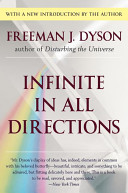Religion and Science are Alike
When I talk about religion, I speak for myself alone. Any statement which attempted to express a consensus of scientists about religious and philosophical questions would miss the main point. There is no consensus among us. The voice of science is a Babel of diverse languages and cultures. That is to me the joy and charm of science. Science is a free creation of the human mind, and at the same time it is an international club cutting across barriers of race and nationality and creed. Many first-rate scientists are Christians, Moslems, Buddhists or Jews, many are Marxists, many are militant atheists, many are like me, loosely attached to Christian beliefs by birth and habit but not committed to any particular dogma.
Science and religion are two human enterprises sharing many common features. They share these features also with other enterprises such as art, literature and music. The most {6} salient features of all these enterprises are discipline and diversity. Discipline to submerge the individual fantasy in a greater whole. Diversity to give scope to the infinite variety of human souls and temperaments. Without discipline there can be no greatness. Without diversity there can be no freedom. Greatness for the enterprise, freedom for the individual — these are the two themes, contrasting but not incompatible, that make up the history of science and the history of religion.
Notes:
Folksonomies: science religion
Taxonomies:
/religion and spirituality (0.661050)
/art and entertainment/books and literature (0.380855)
/science (0.315633)
Keywords:
international club cutting (0.942006 (neutral:0.000000)), science (0.825386 (positive:0.533562)), philosophical questions (0.788571 (negative:-0.289369)), main point (0.788201 (negative:-0.289369)), militant atheists (0.788115 (negative:-0.531213)), first-rate scientists (0.777101 (neutral:0.000000)), particular dogma (0.762582 (negative:-0.319077)), diverse languages (0.759504 (positive:0.423762)), free creation (0.753482 (positive:0.589033)), salient features (0.745172 (negative:-0.304830)), Christian beliefs (0.742914 (neutral:0.000000)), human mind (0.738318 (positive:0.589033)), infinite variety (0.731488 (positive:0.797305)), common features (0.723285 (neutral:0.000000)), individual fantasy (0.722928 (neutral:0.000000)), human souls (0.717470 (positive:0.797305)), human enterprises (0.709883 (neutral:0.000000)), religion (0.644347 (positive:0.233395)), discipline (0.625340 (negative:-0.357613)), diversity (0.602643 (positive:0.438776)), consensus (0.599523 (negative:-0.444240)), greatness (0.583440 (negative:-0.048797)), Moslems (0.518094 (negative:-0.212710)), freedom (0.504191 (negative:-0.180544)), history (0.497420 (neutral:0.000000)), Marxists (0.495934 (negative:-0.477649)), Babel (0.488568 (positive:0.423761)), charm (0.483694 (positive:0.888061)), Buddhists (0.481616 (neutral:0.000000)), nationality (0.479329 (neutral:0.000000))
Concepts:
Religion (0.965706): dbpedia | freebase | opencyc
Christianity (0.956976): dbpedia | freebase | opencyc
Philosophy (0.868310): dbpedia | freebase | opencyc
History of science (0.812194): website | dbpedia | freebase
Science (0.803043): dbpedia | freebase | opencyc
Soul (0.750060): dbpedia | freebase
Human (0.652886): dbpedia | freebase | opencyc
Starship Enterprise (0.630135): dbpedia | freebase





